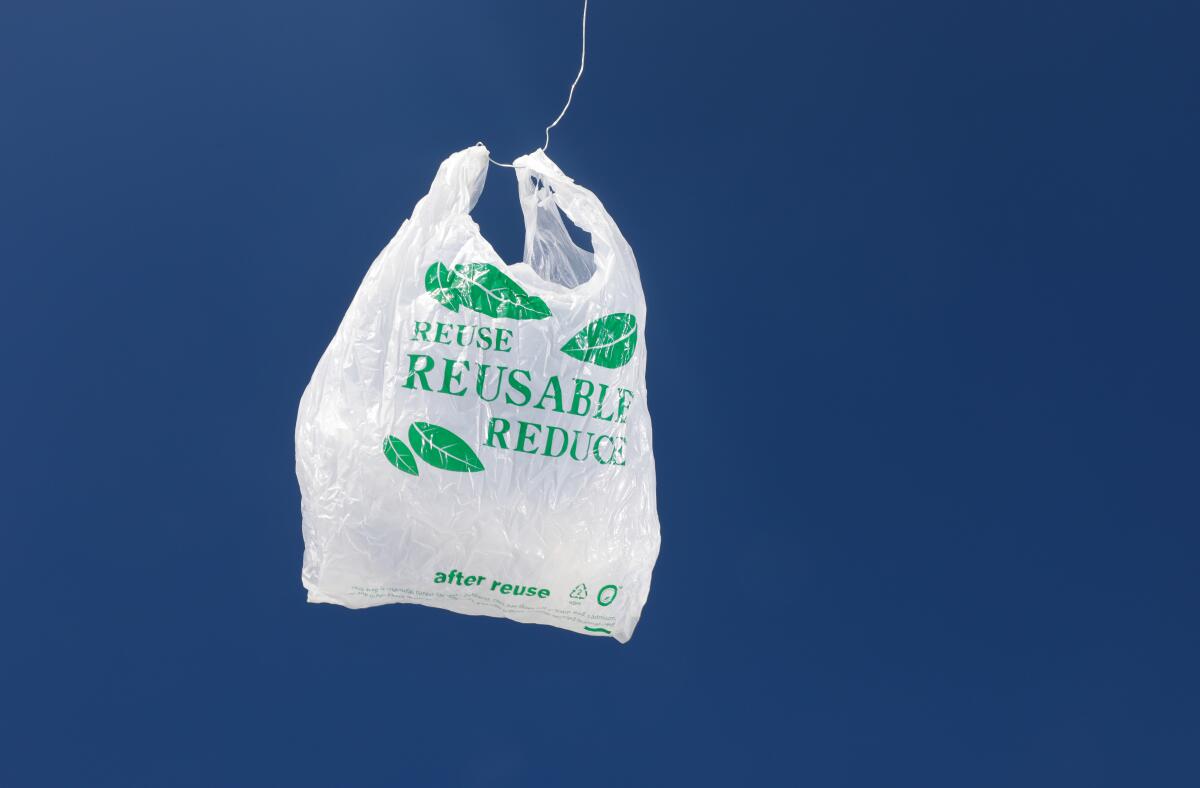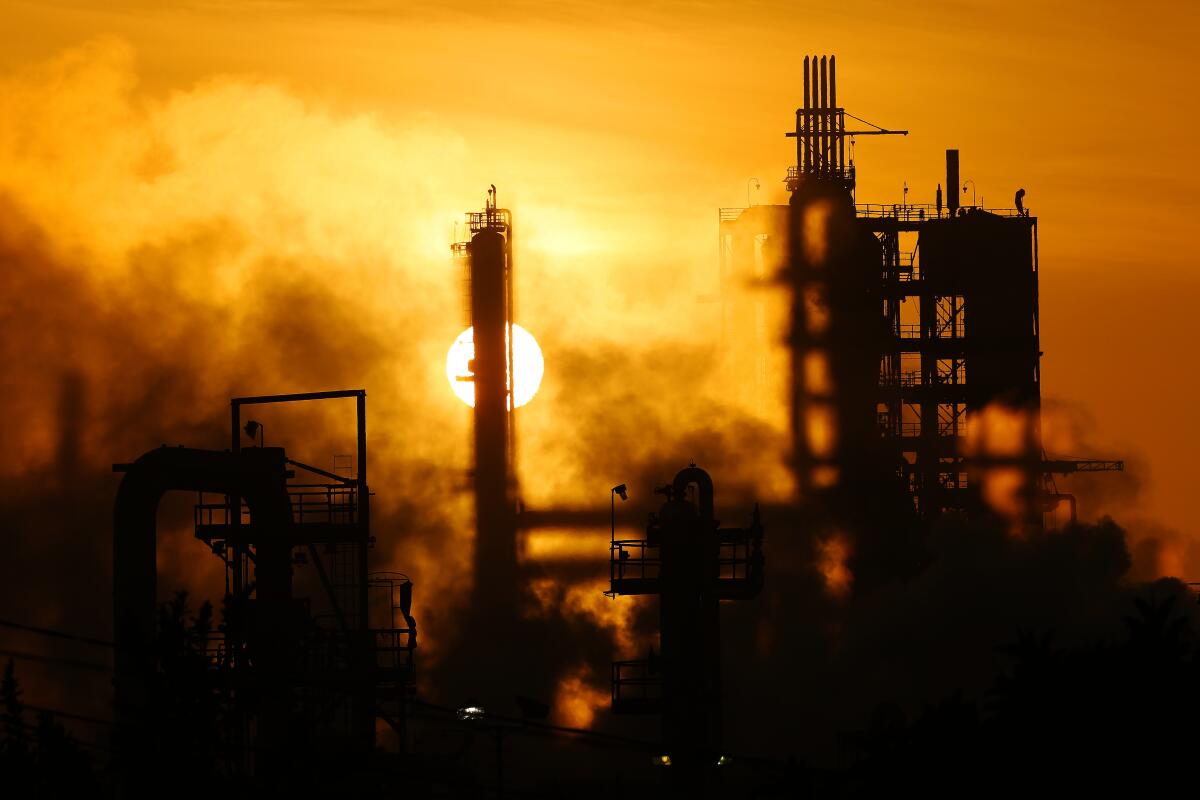In tackling the climate crisis, is there too much focus on individual action?

Good morning. Here’s what you need to know to start your day.
- Balancing individual action and systemic changes to fight climate change.
- California’s COVID surge is finally over. But expect another spike in the coming months.
- The best places to eat and drink in L.A. this month, according to our food writers.
- And here’s today’s e-newspaper
Sign up for Essential California
The most important California stories and recommendations in your inbox every morning.
You may occasionally receive promotional content from the Los Angeles Times.
Accountability for climate change feels out of whack. Here’s why
Environmental action is having a moment in the news cycle.
Last week California Atty. Gen. Rob Bonta sued Exxon Mobil, alleging that the company deliberately deceived the public for decades about how much plastic can actually be recycled, leading consumers to buy and use more of its products.
The state lawsuit calls for the company to create an abatement fund and pay financial penalties “for the harm inflicted by plastics pollution upon California’s communities and the environment.”
Newsom also signed an updated plastic bag ban that’s supposed to address an earlier law’s failure. The state first passed a plastic bag ban in 2014, but allowed thicker “reusable” plastic bags to be purchased at checkouts. That led to Californians throwing away more plastic pound-for-pound than they were before the law took effect.

Last week, Newsom launched a new campaign urging Californians to take everyday climate actions, including shopping secondhand, composting and going on hikes. A carbon footprint researcher told The Times’ Noah Haggerty that the actions probably won’t make much of a dent in emissions.
The slate of news stories about climate justice, government and individual action got me thinking about how the balance — or maybe imbalance — of accountability for the climate crisis is playing out in California and beyond.
It’s easy to look at the state of environmental action and feel pessimistic. We’ve been encouraged for decades to recycle, and government policies have (in theory) made that easier over time. But the statewide recycling rate is lower now than it was a decade ago. The vast majority of the plastic we discard — even if we put it in the right bin — ends up in landfills or elsewhere in the environment.
Political leaders encourage us to drive less, but the lion’s share of money they allot for transportation is spent on projects that incentivize us to drive more.
We’re urged to switch to paper straws, ride bikes or public transit, and plant trees. Meanwhile a celebrity or mogul’s private jet trips spew more CO2 in a week than a dozen households emit in a year. (In conclusion, California is a land of contrasts. Thank you.)
Why does the balance feel so off in California and the rest of the U.S.?
While personal choices are important, Matthew Tejada, senior vice president of environmental health at the Natural Resources Defense Council, said many advocates view the heavy focus on it as a distraction from much-needed systemic changes.
Shifting the onus more toward the fossil fuel industry (which rakes in hundreds of billions in profits) would lighten the burden marginalized communities and ratepayers shoulder, Tejada said.
“A lot of climate policy, both in California and across the United States, is still severely lacking in grounding itself in that equitable frame,” he told me. “Formidable opponents in the oil and gas industry [continue] to push all these systems to stay exactly where they’re at, because that’s to the benefit of oil and gas industries.”
Likewise, Ashfaq Khalfan, director of climate justice for Oxfam America, told me the response to the climate crisis is deeply inequitable and the reason is clear.
“Governments decide how to regulate, what to ban, what to permit. Corporations decide what sort of technology to invest in,” he said. “The utility companies, the car companies, the building companies — they have a huge amount of power to decide these things and are generally deciding on the basis of what they feel is more profitable.”
Of course some people can afford to invest in efforts to reduce their personal emissions, like buying an EV or installing solar panels. But Khalfan says that remains impractical for most low- and middle-income households because of government stagnation and political challenges.
Critics say the focus on individual action can obfuscate accountability for the worst polluters, who also happen to be the wealthiest.
Khalfan co-authored an OxFam report last year which found that the planet’s wealthiest 1% were responsible for as much carbon emissions as the poorest 66% of the world’s population.
Looking at the U.S., he said researchers found that the bottom half of residents by income actually reduced their emissions by about 20% over the last 30 years.
“The top 1% haven’t; no reduction whatsoever,” Khalfan said.
Meanwhile, fossil fuel and plastic companies have invested in PR campaigns that amplify a narrative of individual responsibility for climate change. For example, the now ubiquitous term “carbon footprint” was popularized by British Petroleum. Its own emissions climbed last year as the oil giant increased production.

What would equitable accountability look like?
The biggest impact, according to Tejada and Khalfan: taxing the fossil fuel industry and the ultra-wealthy for their outsize share of emissions and using that revenue to fund resiliency work, with an emphasis on helping communities that already bear the brunt of climate change.
Versions of that are happening in some European countries, but the approach has struggled to win over lawmakers in the U.S., including in blue California, which ranks seventh in the nation for crude oil production and third in refining capacity.
Back in February, state Sen. Caroline Menjivar (D- Van Nuys) introduced the Polluters Pay Climate Cost Recovery Act, which aimed to “require fossil fuel polluters to pay their fair share of the damage caused by the sale of their products … thereby relieving a portion of the burden from climate harms that is currently borne by California taxpayers.”
A few months after it was introduced, Menjivar shelved the bill. Politico reported that she could not secure enough votes for it to pass in the Senate — a sign that Big Oil’s influence still runs deep in California.
The oil industry pumps millions of dollars into state election campaigns. A Times analysis in July found that seven Democrats were among the top 10 California lawmakers who’ve received the most campaign donations from Big Oil interests over the last eight years.
The state Democratic Party’s platform on climate change includes support for “holding corporations accountable to pay their fair share of climate damages they make or have made to communities.”
What can we do about climate anxiety?
I can imagine reading this far may have bummed you out and made you worry about what our communities and the planet will look like if we continue on this trajectory.
Climate anxiety is real and it’s on the rise, Times environment reporter Rosanna Xia wrote in a recent essay. One key to managing it, she said, is to focus less on individual responsibility and more on collective action.
While on the road promoting her book “California Against the Sea,” Rosanna told me that questions about individual vs. systemic change have come up a lot. Here’s a common response she gives:
“While it’s true that no one person can solve climate change alone, it’s also true that we can’t solve it without each and every person being engaged and willing to adapt and work together to consider the changes that we need to make as a system [and] as a society,” she said. “That person you find yourself disagreeing with on climate change? We need that person to also be part of the solution, otherwise we’ll continue to remain stuck in the arguments rather than focusing on how to move forward.”
Today’s top stories

Melania Trump offers staunch defense of abortion rights in new memoir weeks before election
- Melania Trump‘s comments come late in a presidential campaign in which the battle over abortion rights has played a central role.
- “It is imperative to guarantee that women have autonomy in deciding their preference of having children, based on their own convictions, free from any intervention or pressure from the government,” the former president’s wife writes in “Melania,” according to a report published by the Guardian on Wednesday.
California’s summer COVID surge is finally over. But expect another spike in the coming months
- Doctors are urging everyone age 6 months and older to get an updated COVID vaccine now, before another expected resurgence of transmission this autumn and winter.
- One big challenge? Despite widespread acceptance of COVID-19 vaccines when they first became available, interest in the annual updated shots has waned.
- In other health news, valley fever is a growing risk in Central California, but few visitors ever get a warning.
Inside the $351.5-million makeover coming to L.A.’s Exposition Park
- Among the major changes is moving surface parking underground to create six acres of green space. You can find renderings of the massive project here.
- The plan is to make Expo Park feel more like a real park, all in time for the 2028 L.A. Olympics. Work is expected to be completed by late 2027.
- Speaking of the 2028 Olympics, Santa Monica officials said they are “very close” to reaching an agreement to host beach volleyball.
Someone is leaving bottles of urine by a street in Pasadena. Two filmmakers are watching
- A mystery man has a penchant for placing full bottles of human urine on a specific electrical box on Colorado Boulevard.
- The odd phenomenon has attracted the attention of two filmmakers, highlighting the confluence of classic California weirdness and the Hollywood show business hustlers always there to track it.
What else is going on
- A decision to reduce water flows in California’s delta sparked a debate over an imperiled fish.
- After Gov. Newsom vetoed a bill that would have allowed undocumented students to be hired on public universities, a legal effort has been launched to force open this doorway.
- Nearly 70 people were indicted in a bust of the Peckerwoods white supremacist gang in the San Fernando Valley.
- A salmonella outbreak at a popular L.A. Oaxacan restaurant sickened 44 people.
- The Dodgers are going to lean heavily on their bullpen in the playoffs. Whom do they trust?
Get unlimited access to the Los Angeles Times. Subscribe here.
Commentary and opinions
- JD Vance turned in a debate performance that was a true master class — in gaslighting, columnist Robin Abcarian writes.
- As 10 states prepare to vote on abortion rights, Texas shows that abortion bans are deadly for women, columnist Michael Hiltzik writes.
- Author and trans parent Oliver Radclyffe shares what he tells adults who worry when their kids are gender-nonconforming.
This morning’s must read
How one bad deal derailed this prominent L.A. financial services firm. Bryant Riley assembled his L.A. financial service company over 20 years, serving small- to mid-cap companies. Now, his biggest deal ever has gone bad and he’s struggling to save his namesake company.
How can we make this newsletter more useful? Send comments to essentialcalifornia@latimes.com.
For your downtime

Going out
- 🍲 Here are the best places to eat and drink in L.A. this month, according to our food writers.
- 🌆 Locals share their secret tips and tricks for living in L.A., including how to park for free at LAX.
- ⛰️ Looking for some fresh air? Check out these fall road trips to California mountain towns that offer plenty of activities, local bites and peaceful moments.
Staying in
- 📚 Here are 10 promising books that are worth checking out this month, including a look into how Stanley Tucci cooks and entertains.
- 📺 With “La Máquina,” actor Diego Luna is embracing the passage of time.
- 🥗 Here’s a recipe for Dunsmoor’s Lowcountry risotto.
- ✏️ Get our free daily crossword puzzle, sudoku, word search and arcade games.
And finally ... from our archives
On this day in 1995, O.J. Simpson was acquitted of the murders of his former wife, Nicole Brown Simpson, and her friend, Ronald Goldman.
Anticipation in California and throughout the nation reached astronomical levels before the verdict was read. At Cal State Northridge, professors canceled classes and students played hooky, The Times reported. And at Hennessey’s, a Laguna Beach restaurant once frequented by the Simpsons, the “bartender’s betting pool was running 75% in favor of conviction,” according to The Times.
Thirteen years later on the same day, O.J. Simpson was found guilty of armed robbery and kidnapping after he and other men invaded a Las Vegas hotel room to steal sports memorabilia.
Have a great day, from the Essential California team
Ryan Fonseca, reporter
Defne Karabatur, fellow
Andrew Campa, Sunday reporter
Hunter Clauss, multiplatform editor
Christian Orozco, assistant editor
Stephanie Chavez, deputy metro editor
Karim Doumar, head of newsletters
Check our top stories, topics and the latest articles on latimes.com.
Sign up for Essential California
The most important California stories and recommendations in your inbox every morning.
You may occasionally receive promotional content from the Los Angeles Times.





